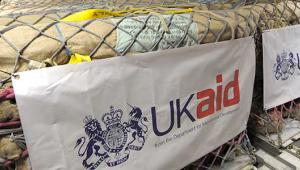In an evaluation of fraud protection used by government departments spending more than £12bn ($15bn) per year in UK aid, the National Audit Office noted that detecting fraud in aid posed some unique challenges.
It focused on the UK Department for International Development, which spends the lion’s share of the British aid budget. DFID reported losses worth just 0.03% (£3.2m: $4m) of its £9.8bn ($12.3bn) spend over the 2015-16 financial year.
This is significantly less than the fraud detected in the budgets of other UK government departments, such as HM Revenue and Customs (3%) and the Department for Work & Pensions (0.7%).
Aid departments in other countries, however, report even less lost to fraud. In 2015, DFID’s American equivalent, USAID, reported that just 0.0055% of its budget was siphoned off, while Australia’s AUSAID recorded losses of 0.026%.
Over the past 10 years, the average reported exposure of the United Nation’s budget to fraud was also just 0.03%.
However, the UN’s own Joint Inspection Unit has said that under-reporting or non-detection in its organisations could be “significant and endemic”, the NAO pointed out, and that the amount detected was “unusually low” compared to the between 1% and 5% detected by other public and private sector bodies.
The NAO report detailed no evidence that more was being lost to fraud in the DFID budget than was being reported, and noted that this was particularly hard to quantify.
However, it did point out that 55% of DFID’s budget is spent through organisations like the UN, making detection “particularly challenging” and requiring DFID to rely on these organisations’ systems rather than its own.
The department has also committed to spending 50% of its budget in fragile states, which are also the most prone to corruption. However, the NAO said relatively few cases of fraud had been reported in DFID operations in such countries.
Britain’s secretary of state for international development, Priti Patel, said the UK chose to use half its budget in risky environments because they were where the poorest people go hungry, where conflict and economic failure drive migration and where it is most in the UK’s interest to maintain stability.
She added: “In the last three years, DFID has overhauled its approach to fraud, meaning our robust systems are better at preventing and detecting fraud and better at getting taxpayers’ money back.”
Patel highlighted the department’s “zero tolerance” approach, which the NAO agreed was being upheld in its report. It also acknowledged the stronger measures DFID has put in place in response to shortcomings identified in the past, while pointing to weaknesses in the systems of other aid spending departments.
Overall, DFID’s fraud caseload has quadrupled between 2010-11 and 2015-16, with a further increase reported in the latest financial year. The department received 475 allegations of fraud in the first nine months of 2016-17 compared to 429 in the previous year, with the increase primarily in less serious cases.
DFID said this could be attributed to its efforts to increase the awareness of fraud and reporting requirements among its staff and suppliers. It also includes requirements for reporting in contracts or memorandums of understanding where possible, and is taking an increasingly stringent line with international organisations it views as not being up to standard.
Saira O’Mallie, UK interim director of anti-poverty group the ONE Campaign, said that DFID was second to none when it came to reporting and transparency in UK government departments.
However, she added, even 0.03% lost to fraud will seem too high for the taxpayer.
“The British public will recognise that the UK government is working in some of the toughest environments, taking on the world’s greatest challenges,” she said.
“That corruption occurs most in the fragile countries in which DFID works is no surprise, but it is clear that sharper vigilance, stronger policing and even closer scrutiny of the UK aid budget is required.”














